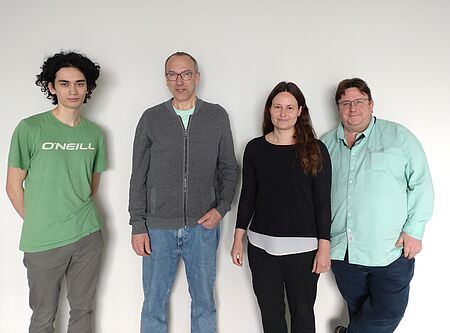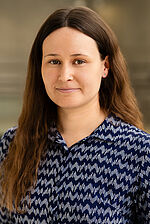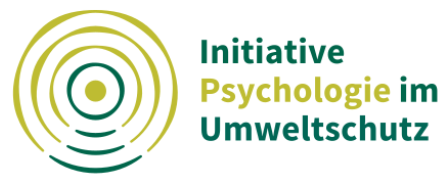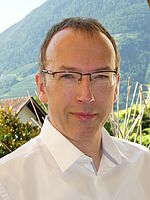Univ.-Prof. Dr.-Ing. Martin Jäschke
A) During the lecture period:
- Summer semester: 1st and 3rd Tuesday of the month, 12-1 p.m., my office
!!! Please note: Consultation hours on May 19, 2026 have been moved forward to May 18, 2026 !!!
- Winter semester: 1st and 3rd Wednesday of the month, 12-1 p.m., my office
B) Outside of the lecture period:
Please visit during the lecture period if possible, as a personal conversation is generally more effective.
Only in truly urgent cases are you to send an email.
Important:
Please select the tab below that corresponds to your inquiry and be sure to read the information provided!
Questions, suggestions and criticism are always welcome!
But: Please be so kind and enrich the module by writing your contribution directly on Moodle into "Forum - Machen Sie mit ...". This way, everyone will benefit and can join the discussion - and I won't have to answer similar questions several times individually, for example. That would be a lot of help to me.
Thank you very much!
Starting October 1st:
Please contact Manuel Krahwinkel, as he is now responsible for all study program advisory services.
The following are responsible ...
... for certificates of achievement according to § 48: BaföG-Amt, more information here.
... for all content-related BaföG questions: BaföG agency
... for issuing a certificate of placement in a particular semester: Student Administration Office
I provide certificates for degree completion ONLY.
Procedure:
I) Fill out the form.
- Enter all your personal details.
- Enter the month and year in which you expect to complete your studies.
Note 1: This is NOT the date of your last exam. Add two months to this date, because only then will your final exam be graded and entered into ahoi, and thus your studies will be completed.
Note 2: The date you enter must not exceed 12 months.
Note 3: I will check whether the date is realistic based on your transcript of records (ToR) – see II).
- Date and signature
II) You must include a current ToR as proof of your achievements to date; a printout from ahoi is not sufficient.
III) Bring the above documents with you to my office hours.
Further notes:
- Individual appointments are not possible, nor is email processing.
- No prior registration is required.
- Please be sure to fill out your forms thoroughly in advance.
More information can be found here.
I can only approve modules for which I am the module coordinator.
Please proceed as follows for recognition:
1) Complete the appropriate recognition form, which you can find here.
2) You send me the following documents by e-mail as clearly legible PDFs:
a) the completed recognition form mentioned in no. 1
b) all(!) required documents, i.e. for all modules that you wish to have accredited by me, in each case
-- title, amount (ECTS or CP or similar) and content of the module according to the module card or equivalent and
-- Type, extent (duration!) and result of all examinations.
The certificates must be official documents from your “old” university. The documents must be complete. Please check this BEFORE you send the documents to me!
3) I will carry out an examination on the basis of the documents submitted and inform you of the result. You come to my consultation hours bringing all original documents and a recognition form filled out with your data. Further information can be found here.
Please contact the respective person matching your request.
I will not forward your e-mails!

Key Areas
Vita
Academic career
1987-1993 Diploma in Physics, University of Göttingen
1998-2007 Diploma in Environmental Science, University of Koblenz-Landau, while in employment
2005-2011 Master of Organizational Psychology, Fern-Universität Hagen, while in employment
2008-2013 Engineering Doctorate at the Leibniz Institute for Ecological and Regional Development (IÖR) and at the TU Dresden, Faculty of Architecture, while in employment.
Topic: Noise Mapping and Quiet Areas
Job experience
1993 - 1995 University of Göttingen
1997 - 1999 Environmental Office, City of Göttingen
1999 - 2004 Regional Council Darmstadt and Gießen: Immission and Radiation Protection
2005 - 2016 Hessian State Office for Environment and Geology: Immission Control
since 2016 HafenCity University Hamburg

Image © Oliver Reetz.
Research Associate
Associated Member of the Research Training Group
"Urban Future-Making"
Wintersemester 2025/26
Social Aspects in the Construction Sector
Seminar
Wed, every 2 weeks
2:15 – 5:45 pm
Communication and Presentation (BIW/GEO)
Exercise
Fri, every 2 weeks
12:15 – 3:45 pm
I can take on the second supervision of your thesis if the topic matches my expertise.
For this, Prof. Jäschke does not necessarily have to be your first supervisor.
Supervision will be provided following your initiative, i.e. you can contact me via email at any time if you have questions regarding content or methodology. For more extensive queries, we will arrange a personal or digital consultation appointment.
I explicitly do NOT want your thesis in the form of a printed copy.
Writing your thesis in English is also possible.
Collection and creation of Open Educational Resources and their publication on the platform
of the Hamburg Open Online University (HOOU), in order to provide information developed
according to scientific standards, about the socio-ecological local and global entanglements
of building materials to a broad public in a narrative way;
lead: Prof. Sabine Hansmann, head of the department "Architecture, Space and Society".
Project website:
https://blogs.hoou.de/materialnetworks/
Uhrig, Alisa (2019). Ausblick: Nachhaltige Digitalität? Interview zum Thema Digitalisierung in und für
umweltsoziologische(r) Forschung. In: Lukas Sattlegger/Larissa Deppisch/Markus Rudolfi (Eds.).
Methoden umweltsoziologischer Forschung. Tagungsband der 15. Tagung der Nachwuchs-
gruppe Umweltsoziologie. Frankfurt am Main, ISOE - Institut für sozial-ökologische
Forschung, 167–175.
Available online (in German)
https://www.researchgate.net/publication/346084263_Ausblick_Nachhaltige_Digitalitat_Interview_zum_Thema_Digitalisierung_in_und_fur_umweltsoziologischer_Forschung
Bachelor
- Engineering Mathematics I and II
- Theoretical-Conceptual Basics
- Traffic Planning and Infrastructure
- Calculating Noise and Planning Noise Reduction Measures
- Environmental Protection
- Environmental Protection and Scientific Work
Master
- Paradigm Shift
- Planning Procedures
- Immission and Noise Protection
- Noise Protection (TU Hamburg)
The cross-curricular project MINTFIT Hamburg offers prospective STEM (German: MINT) students anonymous and free online tests and courses in mathematics, physics, chemistry and computer science (www.mintfit.hamburg). In 2019/2020, the HCU co-developed the MINTFIT computer science test, which prospective students can use to prepare for computer science content in their STEM studies. For this purpose, computer science lecturers throughout Germany were surveyed on topics relevant to them and the results were scientifically published.
In the MINTFIT e-assessment part of the project, lecturers at Hamburg's universities are supported in conducting electronic examinations. At HCU Hamburg, mathematics exams are being converted from paper to digital. For this purpose, tasks were redesigned and implemented in an examination system (WeBWorK). This required a lot of preparatory work, but offers many advantages, as the exams are corrected "at the push of a button", students receive their results faster and, for example, paper is saved as well. The testing center of the Hamburg MINT universities, which is set up on the TUHH campus and also used by the HCU, consists of 100 laptops. It is coordinated by the Arbeitsstelle MINTFIT Hamburg (AMH), which is a joint institution of the Hamburg MINT universities.
You are welcome to write your thesis with my supervision any time.
The most important steps in this case are the following:
I) Think for yourself
If you have not already done so, please reflect as specifically as possible(!!!):
1) Which topic or topics would be suitable for you? - Which ones definitely not so.
2) Which methods (literature research, calculations, measurements, observations, surveys, interviews, ...) would you like to use? - Which of them under no circumstances?
3) Whom would you consider as a second supervisor - Whom not?
II) Exchange your ideas with me
4) Contact me via email to schedule a consultation.
5) During this consultation we will clarify additonal details together. Possibly we will then already have found your topic or - if not - we will simply meet again.
As you can see, it is very important to me that you find a topic which motivates or even inspires you.
Regarding the thesis, please also note the following information:
- general rules (ASPO), which apply to all courses of study.
- special rules (BSPO), which additionally apply to your study program, e.g. for BIW-Bachelor or BIW-Master.
- for me, you have to add and adhere to the extended declaration of authorship (including AI; in German).
A selection of completed thesis topics can be found in the tab below.
Information on the layout of student term papers and theses can be found here.
In addition, we have compiled small handouts for you on the work steps of a term paper or thesis (in German):
0. Exposé
- Themenfindung und Forschungsfrage
- Literaturrecherche und Quellenauswahl
- Lesetechniken und Exzerpte
- Wissenschaftliches Arbeiten und Zitieren
- Wissenschaftliches Schreiben, Redigieren und Eigenkritik
In addition, you will find overview documents on various methods that you can use in your term paper or thesis (in German):
A) Interviews
B) Umfragen
C) Beobachtungsstudien
Important note:
These documents are intended to give you a first impression to help you choose your topic and the appropriate method - however, it is essential that you read relevant literature on the chosen method for your thesis! You will also find references to such in the handout.
When turning in your thesis:
Your supervisors receive an official e-mail on where to download your work after you submitted it. So there is no need for you to additionally send a link or PDF-file.
- Digitale Flucht- und Rettungssysteme in Großbauten: Analyse dynamischer und adaptiver Konzepte unter Einbeziehung von KI-Algorithmen
- Welche Potenziale und Grenzen ergeben sich beim Einsatz CO2-neutralen Betons im Hochbau im Vergleich zu konventionellem Beton?
- Subjektive Wahrnehmung der Verkehrssicherheit durch Zufußgehende an innerstädtischen Baustellen – Eine empirische Untersuchung am Beispiel der Baustelle S-Bahnhof Sternschanze (Hamburg)
- Urban Mining im Gebäuderückbau: Einfluss auf Umwelt und Klima – Eine systematische Literaturauswertung
- Bemessungswerte und -Methode für Abwasseranlagen, Erfordernisse für die Behandlung von Mikroplastik
- Vergleich von Lärmmessung mit Lärmberechnungen anhand drei verschiedener Straßentypen in Hamburg
- Inwiefern können Bauabfälle im deutschen Hochbau durch organisatorische oder wirtschaftliche Maßnahmen verringert oder recycelt werden?
- Wie sich die Biodiversität auf Gründächern langfristig entwickelt und von bodennahen Habitaten unterscheidet
- Lärmbelästigung in einer Wohnunterkunft für Geflüchtete und deren Umgebung in Hamburg
- Umweltgerechtigkeit auf kommunaler Ebene – eine GIS-gestützte Analyse gesundheitlich relevanter Umweltfaktoren in Regensburg (Extern)
- Beton-3D-Druck im Bauwesen: Wie kann dieser dazu beitragen, die Herausforderungen des deutschen Bausektors zu bewältigen?
- Lichtverschmutzung: Einfluss von Außenbeleuchtung auf die Kriminalität und das Sicherheitsempfinden in Wohngebieten
- Road transport related air pollution in Greater Cairo: A critical assessment and proposals for mitigation strategies and measures
- Autofreie Städte: Auswirkungen auf Umwelt, Lebensqualität und urbane Entwicklung. Eine Analyse anhand von Literaturauswertungen und Befragungen
- Verkehrssicherheit an urbanen Knotenpunkten: Potenziale und Herausforderungen von Diagonalquerungen und Rundum-Grün-Phasen zur Optimierung der Fußgängerströme
- BIM-Implementation in einem Ingenieurbüro für die Zuwegeplanung von Umspann-werken – Analyse von Chancen und Risiken anhand von Interviews
- Vulnerabilität und Resilienz bei der Sanierung baukulturell wertvoller Gebäude in Norddeutschland – Eine Analyse von Konfliktfeldern und Leitbildern zwischen Akt-euren
- Umweltbezogener Gesundheitsschutz in den Gesundheitsdienstgesetzen der Länder – eine qualitative Inhaltsanalyse der Handlungsgrundlage des öffentlichen Gesundheits-dienstes (Extern)
- Einfluss der Verkehrsstärke auf die Sicherheit von zu Fuß Gehenden und Radfahren-den an Kreuzungen mit Lichtsignalanlage
- Potenzialanalyse des Einsatzes von künstlicher Intelligenz zur Reduzierung von Arbeitsunfällen auf Baustellen
- Defensive Architektur: Wahrnehmung, Einfluss und Akzeptanz im öffentlichen Raum
- Maßnahmen zur Reduzierung von Elterntaxis am Beispiel einer Grundschule in Hamburg
- Nachhaltige Lösungsansätze für Schieneninfrastrukturen unter extremen Wetterbedingungen in den Wüsten Saudi-Arabiens
- Berücksichtigung der Treibhaus-Bilanz bei der Vergabe von Straßenbauprojekten und deren Ermittlung in der Planungsphase
- Die grünen Barrieren der Stadt. Diskussion von Nahmobilitätsnetzen in und um Park-anlagen am Beispiel der Karlsaue in Kassel
- Klimaanpassung in Städten - "Maßnahmen zur Reduzierung von Hitzeinseln und Anpassung an den Klimawandel"
- Barrierefreiheit im öffentlichen Nahverkehr: Eine Aktualisierung des HVV-Leitfadens zur Gestaltung taktiler Blindenleitstreifen auf Bahnsteigen der U- und S-Bahn in Hamburg
- Mehr Sicherheit für alle: Verbesserung der Verkehrssicherheit und die damit verbundenen Auswirkungen auf alle Verkehrsteilnehmer
- ESG-Antrieb und Auswirkung auf die Bauwirtschaft. Wie kann sich die Baubranche trotz ihrer aktuellen Problemstellungen ESG-konform entwickeln und somit tatsächlich zum Klimaschutz beitragen?
- Unfallhäufungen in der Waitzstraße (Hamburg) - Ein Vergleich von Maßnahmen zur Vermeidung
- Gesellschaftliche Akzeptanz des autonomen Fahrens — Befragung in der Metropolregion Hamburg
- Nanomaterialen als Alternative zu biozidhaltigen Außenwandfarben und deren Umweltauswirkungen
- Emissionsbilanzierung von elektrisch betriebenen Luft-Wasser Wärmepumpen und Gasthermen bei Wohngebäuden in der Bundesrepublik Deutschland unter der Betrach-tung des Produktlebenszyklus
- Erfassung und Analyse von Raumluftdaten eines Sensornetzwerkes zur optimierten Nutzung von raumlufttechnischen Anlagen in einer Labor- und Büroumgebung (Ex-tern)
- Analyse ausgewählter Hamburger Straßen auf Fußgängerfreundlichkeit anhand eines neu entwickelten Kriterienkatalogs
- Reduzierung von Wartezeiten für Zufußgehende bei Steigerung der Verkehrssicherheit an Knotenpunkten mit geringen Verkehrsbelastungen in den Nebenrichtungen
- Bautechnischer Vergleich des heutigen Asphalt- und Betonautobahnbaus mit Blick in die Zukunft
- Mobilitätswende durch Digitalisierung - Chancen und Herausforderung für eine auto-arme Stadt
- Fahrradverkehr -Welche Rolle spielt das Fahrrad im Berufs- und Freizeitverkehr?
- Geräuschemissionen von Kühltürmen – Lassen sich die Einzelgeräuschemittenten und deren Zusammenwirken bei einem Zellenkühlturm ausreichend genau beschreiben und berechnen? (Extern)
- Umfrage zur Straßenumgestaltung an der Wellingsbütteler Landstraße - Wie sehen die Passanten den Umbau im Hinblick auf den Radverkehr?
- Neuplanung einer innerstädtischen Hauptverkehrsstraße. Umgestaltung von innerstädtischen Hauptverkehrsstraßen für eine erhöhte Verkehrssicherheit und Aufenthaltsqua-lität am Beispiel der Borsteler Chaussee
- Sind Gebäudeaufstockungen in Holzbauweise eine zukunftsorientierte Lösung? Eine Analyse über die Aufstockung von bestehenden Gebäuden mit Holz als langfristige und klimaschonende Möglichkeit der Verdichtung
- Mitarbeiterbefragung in einem Unternehmen des Bau- und Projektmanagements: Wie lässt sich die interne Organisationsstruktur bei Bauvorhaben verbessern?
- Chlorparaffin als Gebäudegefahrstoff - Entwicklung einer Handlungsempfehlung zur Bestimmung und Bewertung von Bauteilen mit Verdacht auf Chlorparaffinbelastung
- Klimaneutralität bei der Deutschen Bundesbank (Extern)
- Biodiversität im Gebäudeumfeld - Welchen Beitrag leisten unversiegelte Flächen?
- Auswertung einer Marktabfrage unter Nachhaltigkeitsaspekten für ein Standardwohngebäude eines Projektentwicklers
- Moosbasierte Lösungen zur Feinstaubreduktion im urbanen Raum. Möglichkeiten und Grenzen – eine vergleichende Untersuchung
- Eine Untersuchung des Faktors Partizipation bei urbanen Gemeinschaftsgärten in Hamburg. Eine Analyse auf Quartiersebene anhand ausgewählter Beispiele als Beitrag zu einer umweltgerechteren Stadt
- Luftqualität in Hamburg – Auswertung und zeitliche Entwicklungen (Extern)
- Untersuchung der Problematik zur Entwicklung von Wohnbebauung in geruchlich hochbelasteten landwirtschaftlich geprägten Ortschaften in Niedersachsen (Extern)
- Systematische Analysen der innovativen und erprobten Schallschutzmaßnahmen an Schienenverkehrswegen und Erarbeitung einer Matrix für städtebauliche Planungen (Extern)
- Verträglichkeit von Protected Intersections mit Bedürfnissen des Fußverkehrs. Ein Vergleich regelkonformer Kreuzungen in den Niederlanden und Hamburg
- Pavement-Management-System (PMS) für kommunale Straßen: Untersuchung am Bei-spiel der Stadt Hamburg
- Dimensionierung des Straßenoberbaus von Bundesfernstraßen. Vergleich der Regel-werke RDO mit RStO
- Anforderungen an ein systematisches Erhaltungsmanagement für Nebenflächen. Untersuchungen am Beispiel der Freien und Hansestadt Hamburg
- Einwegbecher in der Cafeteria der HafenCity Universität Hamburg. Studie zur Diskrepanz zwischen Umweltbewusstsein und Umweltverhalten
- Untersuchung des Verkehrs- und Mobilitätsverhaltens an der HafenCity Universität
- Entwicklung von Einsatzkriterien für Planungsvarianten des Radverkehrs mit Hilfe von Experteninterviews. Erstellung von Planungsentwürfen anhand einer ausgewähl-ten signalisierten Knotenpunktzufahrt
- Umweltverträglichkeitsprüfung von Neubaustrecken im Schienenverkehrsnetz. Lückenschluss im schienengebundenen Nahverkehr zwischen Buxtehude und Altona, Hamburg
- Im Dialog mit der Nachbarschaft. Untersuchung und Evaluation einer projektbegleitenden Baustellenkommunikation bei privaten Bauvorhaben
- Wie wirken sich energetische Sanierungsmaßnahmen auf Umwelt und Bewohner aus? Bewertung am Beispiel von Wohngebäuden in Mümmelmannsberg
- Schalltechnische Untersuchung des Gebietes Hillenklint (Seevetal. Kombination der Ergebnisse aus Befragung, Messungen und Berechnungen
- Elektromobilität – Analyse der Nachhaltigkeit durch Experteninterviews
- Verkehrssicherheit im Straßenraum am Beispiel Alte Landstraße: Analyse und Verbesserungspotential
- Vergleich der Lebensqualität in den zwei Lübecker Wohngebieten St.-Annen-Straße und Sternenring
- Diesel-Durchfahrtsbeschränkungen in Hamburg: Eine Analyse auf Grundlage von Befragungen Betroffener am Beispiel der Stresemannstraße
- Umgestaltung einer Straßenkreuzung zu einem Kreisverkehr. Vergleich zwischen der herkömmlichen Planungsmethode und BIM
- Vergleich des Heizvlieses „Feegoo“ mit einem konventionellen Heizsystem
- Was kann getan werden, um die Kosten im Rahmen der Gebäudezertifizierung zu begrenzen am Beispiel von ausgewählten Bauteilen
- Experteninterviews zum Fluglärm in Hamburg. Wer will was und was wäre gemeinsam möglich?
- Licht in der Stadt
- Baulärmschutz in der Praxis – explorative Experteninterviews

Are you interested in environmental protection and psychology?
Then the Initiative Psychologie im Umweltschutz e.V. (IPU; engl.: "Initiative for Psychology in Environmental Protection") is the right place for you!
Here you will find:
- the latest findings in environmental psychology research
- online lectures and other educational materials
- networking opportunities and conferences
- internship platform
- theses
- and much more!
Discover the world of environmental psychology at
https://ipu-ev.de/ (in German)
Key Areas
Topics
- Prevention and control of environmental stress factors
- Protection of unstrained areas
- Noise, light, air, ...
- Quality of life, well-being and health
- Organizational development, communication, mediation, ...
Methods
- GIS, computer simulations, calculations
- Measurements
- Interviews, surveys, observations
- Literature and data analysis
- ...




